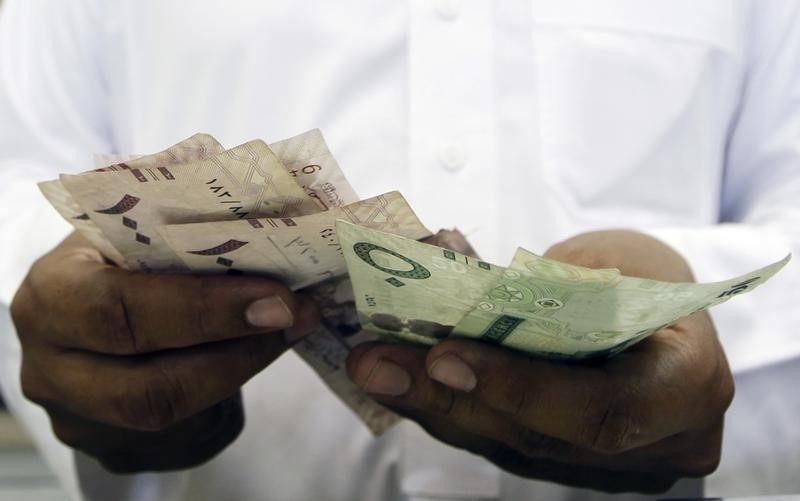By Archana Narayanan
DUBAI (Reuters) - Saudi Arabia is seeking a bank loan of between $6 billion (£4.2 Billion) and $8 billion, sources familiar with the matter told Reuters, in what would be the first significant foreign borrowing by the kingdom's government for over a decade.
Riyadh has asked lenders to submit proposals to extend it a five-year U.S. dollar loan of that size, with an option to increase it, the sources said, to help plug a record budget deficit caused by low oil prices.
The sources declined to be named because the matter is not public. Calls to the Saudi finance ministry and central bank seeking comment on Wednesday were not answered.
Last week, Reuters reported that Saudi Arabia had asked banks to discuss the idea of an international loan, but details such as the size and lifespan were not specified.
The kingdom's budget deficit reached nearly $100 billion last year. The government is currently bridging the gap by drawing down its massive store of foreign assets and issuing domestic bonds. But the assets will only last a few more years at their current rate of decline, while the bond issues have started to strain liquidity in the banking system.
London-based boutique advisory firm Verus Partners, set up by former Citigroup (NYSE:C) bankers Mark Aplin and Andrew Elliot, is advising the Saudi government on the loan, the sources said.
The firm has sent requests for proposals to a small group of banks on behalf of the Saudi Ministry of Finance, the sources said. They added that banks participating in the loan would have a better chance of being chosen to arrange an international bond issue that Saudi Arabia may conduct as soon as this year.
A spokesman for Verus Partners was not immediately available to comment.
RATING CUT
Analysts say sovereign borrowing by the six wealthy Gulf Arab oil exporters could total $20 billion or more in 2016 - a big shift from years past, when the region had a surfeit of funds and was lending to the rest of the world.
All of the six states have either launched borrowing programmes in response to low oil prices or are laying plans to do so. With money becoming scarcer at home, Gulf companies are also expected to borrow more from abroad.
In mid-February, Standard & Poor's cut Saudi Arabia's long-term sovereign credit rating by two notches to A-minus. The world's other two major rating agencies still have much higher assessments of Riyadh, but last week Moody's Investors Service put Saudi Arabia on review for a possible downgrade.
Nevertheless, bankers said a sovereign loan from Saudi Arabia could attract considerable demand, given the kingdom's wealth; its net foreign assets still total nearly $600 billion, while its public debt levels that are among the world's lowest.
The pricing of the loan is likely to be benchmarked against international loans taken out by the governments of Qatar and Oman in the last few months, according to bankers.
Because of banks' concern about the Gulf region's ability to cope with an era of cheap oil, those two loans took considerable time to arrange and the pricing was raised during that period.
Oman's $1 billion loan was ultimately priced at 120 basis points over the London interbank offered rate (Libor), while Qatar's $5.5 billion loan was priced at 110 bps over, with both concluded in January.
"The indications are that a Saudi deal would have to price higher than that, as the world has changed significantly since those deals," one Middle East-based banker said, referring to the rating agencies' actions.
